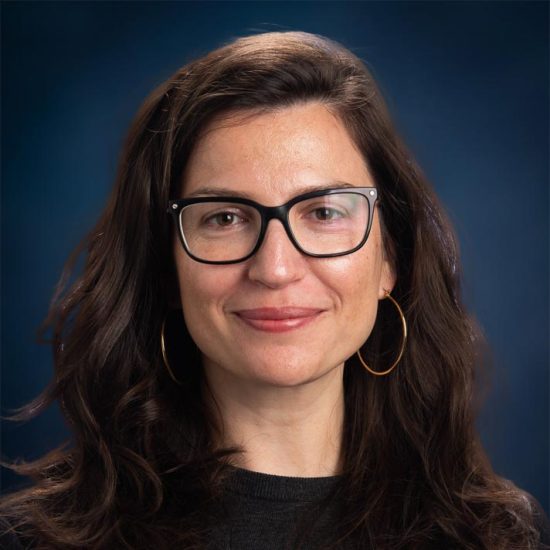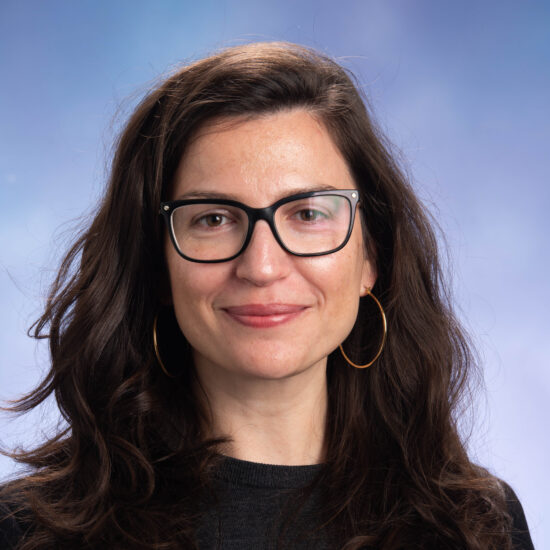Elie Wiesel once said: ‘Listening to a witness makes you a witness,’ and I have been inspired a great deal by his vision of teaching as an act of guidance and mentorship. Teaching requires my curiosity and commitment to life-long learning from teachers and guides that came before me, and from the knowledge I gain from my students’ process and through grappling with their questions.
Eralda L. Lameborshi, Ph.D. Assistant Professor
- Faculty

Eralda L. Lameborshi is an Assistant Professor of World Literature in the Literature and Languages Department at A&M-Commerce. Her work focuses on world literature and the global novel, Eastern European literature, and world cinema. She is the recipient of the Global Human Rights Fellowship at A&M-Commerce, the Hagler Institute for Advanced Study Fellowship and the Elizabeth Greenwade Qualls '89 Endowed Fellowship.
A Conversation with Dr. Eralda Lameborshi
Why do you like teaching?
Meaning making often feels as though we – my students and I – are wondering in a dark room looking for a light switch or a window latch to let the light in. Although it may feel like an endeavor that is never fully realized, there are moments that feel complete: as we work through a challenging text or sets of questions, amid the deliberations and debates, there are times where I witness students find the light switch or the window latch. As a result we all get to see more clearly, to be more curious, and the simple act of asking generative questions that in themselves transmit information becomes a source of hope. Elie Wiesel once said: “Listening to a witness makes you a witness”, and I have been inspired a great deal by his vision of teaching as an act of guidance and mentorship. Teaching requires my curiosity and commitment to life-long learning from teachers and guides that came before me, and from the knowledge I gain from my students' process and through grappling with their questions. I like teaching for this reason: how it demands a daily commitment to learning and asking questions that lead the classroom toward a more compassionate engagement with, and radical acceptance of a multiplicity of truths.
What is a project you are currently involved in?
I am currently working on several articles about Kosovar Cinema and the Kosovar New Wave. As Europe's youngest nation, Kosovar film industry has experienced a flourishing of cinematic narratives that at once challenge and celebrate Kosovar culture. It is a project that has a great deal of meaning for me as an Albanian-American and member of Albanian diaspora.
Education
- Ph.D., English, Texas A&M University, 2017
- M.A., English, Stephen F. Austin State University, 2009
- B. S., Computer Science, Harding University, 2003
Research Interests
- World Literature and the Global Novel
- Eastern European Literature
- World Cinema
- Eastern European Film
- Ottoman Studies
Teaching Areas
- World Literature
- Film
Featured Courses
- ENG 520 Contemporary Critical Practices in English Studies
- ENG 509 Literary Genres
- ENG 610 Studies in Film Genre
- ENG 420 Approaches to Literature
- ENG 432 History and Aesthetics of Film
- ENG 434 Literature and Film
Selected Publications
“Ideological Fluency and World Literature: The Case of Ismail Kadare,” Discourses on Nations and Identities, Daniel Syrovy and Achim Hölter, eds., Vol.3, De Gruyter (Spring 2021).
“The Ottoman Empire, Southeastern European Literature, and Postcolonial Theory,” Journal of World Literature (August 2019) 4.3.
Awards
- Global Human Rights Initiative Fellowship, Texas A&M University-Commerce, 2023
- National Endowment for the Humanities Summer Seminar, “Transcending the Boundaries: The Ottoman Empire, Europe, and the Mediterranean World, 1500-1800,” 2016
- Hagler Institute for Advanced Study, Texas A&M Fellowship, 2016
- Elizabeth Greenwade Qualls ’89 Endowed Fellowship, Department of English, Texas A&M University, 2015
Related News

A&M-Commerce Faculty Named Prestigious Fulbright U.S. Scholar
TAMUC Assistant Professor Eralda Lameborshi, Ph.D., received the prestigious Fulbright U.S. Scholar Award.


